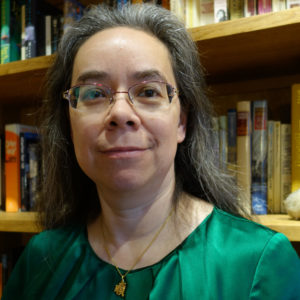Voting continues as Science Fiction & Fantasy Poetry Association (SFPA) members decide who will be honored as Grand Master this year. Five candidates are under consideration: Akua Lezli Hope, Deborah P Kolodji, Mary Soon Lee, Peter Payack, and Terry A. Garey.
Akua Lezli Hope
Akua Lezli Hope, a creator and wisdom seeker, has been in print since 1974 with over 450 poems published. She wrote her first speculative poems in the sixth grade and was a member of the SFPA in the 80s, appearing in Star*Line and Asimov’s back then. Her collections include Embouchure: Poems on Jazz and Other Musics (Writer’s Digest book award winner), Them Gone (Sundress Publications 2018) , Otherwheres: Speculative Poetry (2021 Elgin Award winner), & Stratospherics (micro-chapbook of scifaiku @Quarantine Public Library). A Cave Canem fellow, her honors include the National Endowment for the Arts, two New York Foundation for the Arts fellowships, Science Fiction and Fantasy Poetry Association award & multiple Rhysling & Pushcart Prize nominations. She won a 2022 New York State Council on the Arts grant to create Afrofuturist, speculative, pastoral poetry.
She created Speculative Sundays, an online poetry reading series. She edited the record-breaking sea-themed issue of Eye To The Telescope #42 (www.eyetothetelescope.com) & NOMBONO: An Anthology of Speculative Poetry by BIPOC Creators, the history-making first of its kind (www.sundresspublications.com/e-anthologies/nombono Sundress Publications, 2021). Her work has also been published in numerous literary magazines and national anthologies, including: Africa Risen (Tor, 2022), Black Fire This Time (2022), The Magazine of Fantasy and Science Fiction, The 100 Best African American Poems; Dark Matter: A Century of Speculative Fiction from the African Diaspora; Asimov’s Science Fiction; Gyroscope Review, Pensive: A Global Journal of Spirituality & the Arts, Strange Horizons, Star*Line, SciFaikuest, Eye to the Telescope, The New Verse News, Breath & Shadow, The Crafty Poet II: A Portable Workshop, The Cossack Review, Silver Blade Magazine, Stone Canoe, Panoply, Penumbra, About Place and Three Coyotes, among many others.
She is working on three new speculative poetry anthologies for 2023: Speculative Cats Volume 1 with LindaAnn Schiavo (speculativecats.com); Arboreal Dreams (speculativetrees.com); and Black Multiverse (blackmultiverse.org).
For further information, please see Akua’s website.
Deborah P Kolodji
Deborah P Kolodji served as president of the SFPA from 2006 – 2011. While president, she established the Dwarf Stars Award. Kolodji has also acted as editor or co-editor of multiple anthologies of speculative verse, including several volumes of the Dwarf Stars anthologies. She also co-founded Eye to the Telescope.
In addition to many awards and recognition for her haiku, Kolodji’s fantasy scifaiku “Basho After Cinderella (iii)” placed first in the 2013 Dwarf Stars Awards and was collected in Nebula Awards Showcase 2015. Her early writing included Star Trek inspired poetry for fanzines in the 1970s. Her poetry collections include Tug of a Black Hole (Title IX Press, 2021), Highway of Sleeping Towns (Shabda Press, 2016), Red Planet Dust (2007), and Symphony of the Universe (Sam’s Dot Publishing, 2006), Unfinished Book (Shadows Ink Publications, 2006), and Seaside Moon (Saki Press, 2004).
She’s also generous with new poets and with giving back to the poetry community. She has increased the reach of short-form science fiction poetry in the mainstream haiku and senryu community, and is regularly consulted in this capacity:
www.poetrypea.com/s5e7-scifaiku-a-workshop-with-deborah-p-kolodji/
www.thehaikufoundation.org/omeka/files/original/31563c5175b2578b10d2826c6a4ca643.pdf
(see pgs 75-94)
In short, Debbie is a rock star in the short-form sci-fi poetry community!
For further information, please see Deborah’s website.
Mary Soon Lee
Mary Soon Lee is a gifted fantasy and science fiction author of both stories and poetry. She has won the Elgin Rhysling and Dwarf Star Awards as well as twice winning the AnLab Readers’ Award. Her has appeared in many speculative publications including Analog, Asimov’s, Daily Science Fiction, F&SF, Fireside, New Myths Penumbric, Rune, Star*Line, and Strange Horizons, Uncanny, as well as Science, among others. Her writing continues to raise the bar for poetry.
Winner of the 2021 Elgin Award, her stunning collection, The Sign of the Dragon is an epic fantasy told in poetry. She says “Of all the things I’ve written, it’s the one that matters most to me. It began with a single poem about a boy chosen by a dragon to be king. I meant the poem to be a standalone piece, but the boy stayed with me, and I returned and wrote more, and more, and more poems about him. Over three hundred poems in the end.” About her deft and lovely, Elemental Haiku “Lee has a magisterial ability to impart facts clearly, concisely and engagingly. In these short poems she succeeds in conveying the distinctive characteristics of each element, their inter-relationships, their applications and their role in history, be it on a human, planetary or cosmic scale.”
Her work has earned numerous awards throughout her career, such as her 2022 short Rhysling win for “Confessions of a Spaceport AI. Her work is always engaging and evocative. She has a dry wit about the messiness of transcendence, evolution, one more day. Her approach is always skillfully certain, but kindly even gentle, as you are plunged into the essence of being and not being, strife and peace. She is a prolific, talented, and insightful poet.
For further information, please see Mary’s website.
Peter Payack
Peter Payack is a harbinger of the future of science fiction poetry. And has been for the past fifty years. His science fiction poetry has consistently helped define the genre, having been published, for example, in Asimov’s Science Fiction for six decades, and co-winning the Rhysling award for the Best Science Fiction Poem of the Year in 1980. This was the much-anthologized Migration of Darkness, named by Quirk Books as the number one poem that unites science and art!
Payack brings into the 21st century the ancient Greek traditions of the “rhapsodes,” itinerant poets who would travel from festival to festival along the Greek coast, singing the Homeric hymns in the marketplace (agora), making the measured cadences of Homer accessible, understandable, and easier to memorize; sometimes even employing rhythm sticks to emphasize the measured cadences of the ancient text.
To Payack, the post-modern marketplace consists of the printed page, the night sky, subway walls, the Stonehenge monolith, telephone lines, orbiting satellites and, even consumable art (fortunes cookies). Indeed, one critic described Payack’s “lifelong mission to lift poetry off the printed page.” As one example, his STAR-POEMS! (as commissioned by M.I.T.’s Center for Visual Studies) has flown short science fiction poems in the night time sky over Boston, New York and Delphi Greece.
Michael Benedikt, The Poetry Editor of the Paris Review, has written, “Payack’s genuine concern for the place of Humankind in the cosmos is intermixed with much high wit.” The Boston Phoenix exclaimed, “To read Payack is to embark upon a philosophical wild ride designed to shake loose all your assumptions and open your eyes to new ways of seeing the universe.” The Harvard Crimson proclaimed: “Payack’s intellectual curiosity has led him to read about ancient Philosophy and modern science – knowledge he incorporates into the Payack Version of the Universe.” And The Boston Globe wrote “Peter Payack Blends High Tech with New Age,” and in another article called him “The Space Age Poet”.
This accessibility has led to his election as the first Poet Populist of Cambridge, Massachusetts. And there is good reason why he is – though his “Phone-a-Poem” collection is housed at Harvard’s esteemed Woodberry Poetry Room, Payack is no Ivy-tower elitist. You would you never find Payack holding court in a dissolute state at the local pub. He is too busy lecturing on courses in English and Scientific Communications at two of Boston’s fine universities.
For further information, please see Peter’s website.
Terry A. Garey
Beginning in the 1980s, Terry A. Garey has been one of the most influential organizers of the speculative poetry movement. A pioneering editor of speculative poetry, she served as the first poetry editor of Tales of the Unanticipated (1986 to 1991) and for Janus, and was active in WisCon from its 1977 inception, hosting well-attended poetry workshops in the 80s and 90s.
Her poetry has been published in many journals and anthologies, including Dodeca, Uranus, Star*Line, Asimov’s, Weird Tales, The Magazine of Speculative Poetry, Raw Sacks, Paper Bag Writer, Dreams and Nightmares, Women en Large, and the critically acclaimed Burning With A Vision. Her anthologies, Time Gum, 1988, and Time Frames, 1991, are important introductions to the genre. Her particular oeuvre is an intergalactic variation on domestic fabulation where she used her own domestic experience as a launch pad for her poems and then showcased them as a founding member of the highly regarded poetry performance group Lady Poetesses from Hell. Of her four Rhysling nominations, she earned first place in 2013 for her short poem “The Cat Star” and first place in 1997 for her long poem “Spotting UFOs While Canning Tomatoes.”
For further information, please see Terry’s website.
To date, the SFPA has conferred nine Grand Master Awards:
- Linda D. Addison (2020)
- Ann K. Schwader (2018)
- David C. Kopaska-Merkel (2017)
- Marge Simon & Steve Sneyd (2015)
- Jane Yolen (2010)
- Ray Bradbury (2008)
- Robert Frazier (2005)
- Bruce Boston (1999)
Discover more from File 770
Subscribe to get the latest posts sent to your email.





